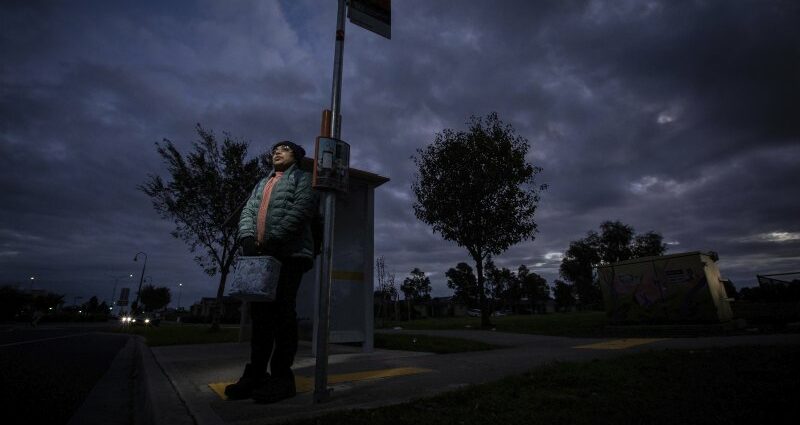Save articles for later
Add articles to your saved list and come back to them any time.
The Andrews government is facing calls to prioritise improving Melbourne’s bus network amid expectations it will slash transport and infrastructure spending in a painful state budget next week.
Concerns that long-awaited upgrades may be further delayed come as research from Infrastructure Victoria reveals residents in outer suburbs are the least likely to consider using buses – even though they are often the only public transport – because of poor services.
Nasreen Mohamed walks for almost half an hour most days to reach her closest bus stop in Wyndham Vale.Credit: Darrian Traynor
Nasreen Mohamed is one resident in the outer west who has no choice but to catch a bus to get to work most mornings. That means leaving her home in Mambourin, a new housing estate, at 6am and walking for 25 minutes in the dark to the nearest bus stop in Wyndham Vale.
“It’s very dark and I’m so scared to walk on that road. I’m alone and by myself but I have no other way,” said Mohamed, who is learning to drive but cannot afford to buy her own car.
Mohamed said she and her husband bought a block of land in Mambourin in 2019 after the developer assured them bus services would be extended into the new suburb. Since moving in two years ago, she has had to turn down work and study opportunities and even cancel medical appointments because she could not get there.
“I’m not the only one. There are so many people suffering in different areas that have been developed recently because there is no public transport,” she said.
The Andrews government launched a plan in 2021 to improve the bus network, with simpler and more frequent routes and moves to transition the fleet to electric buses. It committed $109 million to fund the plan over three years in last year’s budget.
Elyse Cunningham, coordinator of a Friends of the Earth campaign for better buses in the western suburbs, said she feared funding would dry up in next Tuesday’s budget, which Premier Daniel Andrews said would include “very difficult” decisions to bring rising debt under control.
“So far we haven’t really seen that much meaningful progress,” Cunningham said. “We’re not seeing that major reform that is going to have the most benefit to communities and allow for the service increases that are needed. It’s even more crucial now that the government commits to bus reform in this term of government.”
New research by Infrastructure Victoria released to The Age shows that only 19 per cent of people in outer growth areas consider using buses to get around, compared to 24 per cent across the greater Melbourne and 40 per cent in the City of Manningham, where buses are fast and frequent.
Infrastructure Victoria chief executive Jonathan Spear said improving services and growing patronage across the whole network could be achieved by making buses faster, simpler and cheaper.
“We know if we want to meet people’s public transport needs relatively quickly, buses are probably the number one opportunity to do so,” Spear said.
Eighty-two per cent of Melburnians live within a five-minute walk of a bus stop. But the independent government advisor’s research, based on surveys with 4000 Melburnians, shows only one-fifth of residents know where those buses go.
People would be willing to walk five minutes further (up to a maximum of 15 minutes) to reach a bus that travels 10 per cent faster or departs every 20 minutes instead of every 30 minutes, the research found.
Nasreen Mohamed walks for almost half an hour most days to reach her closest bus stop in Wyndham Vale.Credit: Darrian Traynor
And respondents were 19 per cent more likely to catch a bus with every $1 that fares were reduced. Bus fares start at $4.60 for a full-fare two-hour pass, the same as travelling on trains and trams.
“We think bus fares should be much cheaper than they currently are,” Spear said.
“Generally, the people who are using buses are less well off, and we also know that buses are relatively underused. Price is one of the ways of getting greater use.”
Metropolitan Transport Forum chair Jonathon Marsden, whose group represents 27 local councils, said improving the bus network was Melbourne’s most urgent transport need.
“In a tight budget environment, buses must be prioritised,” he said. “The vast majority of the western suburbs have no choice but to drive a car and bus reform that would bring more affordable and comfortable and public transportation within reach for everyone, saving time and money for families.”
Public Transport Ben Carroll said the government was trialling new types of bus services in Melbourne’s north and north-eastern suburbs and in Mildura as part of the Bus Plan, with community feedback on direct and frequent new routes set to be released in the coming weeks.
“We’re reforming the bus network and through our plan, we’re also improving existing routes and adding new ones, as well as rolling out more electric buses to support our transition towards a cleaner and more sustainable bus fleet,” he said.
Infrastructure Victoria will release a final research report including recommendations for government later this year.
The Morning Edition newsletter is our guide to the day’s most important and interesting stories, analysis and insights. Sign up here.
Most Viewed in National
From our partners
Source: Read Full Article
-
Killer who handcuffed ex-girlfriend and slit her throat could be freed
-
Trump verdict courts disaster no matter how it lands
-
Elon Musk warns Nuclear war chance rising rapidly responding to Mad Max theory
-
Twins get cancer symptoms at same time – but only one has killer disease
-
Moment armed police arrest 'Islamist' who stabbed tourist to death



